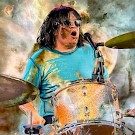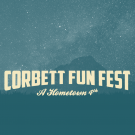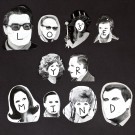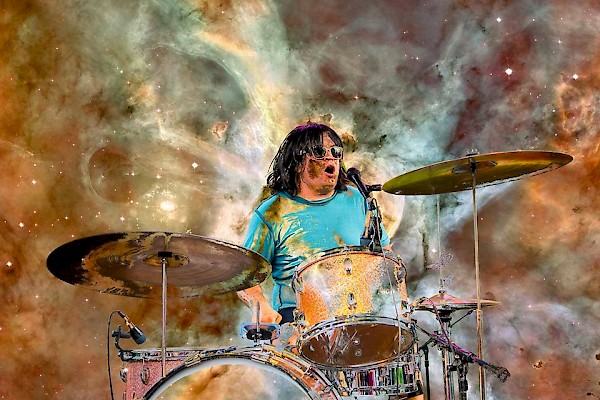 Photo by Joshua J Force
Photo by Joshua J Force
If you attend enough live shows in this city, you begin to recognize a lot of the same people in attendance. There’s a thirst for the viscera of performance in venues both tiny and large that attracts the wonderment of a faction of the art-starved populace who simply never tire of having their minds blown in some way or another. Rarer—assuming you go see a lot of different bands playing in myriad environments within disparate alcoves of the overarching scene—is noticing one person popping up onstage in wildly diverse projects all over the place, all the time. For David “Papi” Fimbres, his omnipresence in Portland’s boiling-pot musical community grows from that same bubbling passion that fuels show-going regulars. He is seeking out a communal, reciprocating mind-meld every time he steps onstage in front of people. And he steps onstage a lot.
Fimbres is, as of this writing, an active member of 22 separate projects in the city of Portland. That’s 22 separate groups of interpersonal chemistry to navigate, 22 personal mindsets to negotiate, 22 rehearsals—potentially—to fit into a day that, last time anyone checked, only has 24 hours in it. Among this panorama of bands are the fantastic cumbia-centric group Orquestra Pacifico Tropical, the experimental prog-punk of Sun Angle, the decadent electro-funk-pop of Minden, and that’s not even counting Fimbres’ impressively psychedelic dance experimentations as Paper/Upper/Cuts, one of his aliases. It’s a dizzying, dazzling kind of world he lives here in Portland these days. But it didn’t start out all roses.
Growing up in the poor Latino neighborhood of Pico-Union, just outside downtown Los Angeles, Fimbres’ childhood was marred by siblings in gangs, helicopters hovering overhead, gunshots at night, and not much music.
“I thought that was normal,” Fimbres explains. “My mom really did not want me to live the same life that my older siblings did. So she involved me in music classes for free at a rec center.”
At 4 years old, Fimbres was learning the piano and soon moved onto flute. After a few years, however, he was introduced to the drums. Fimbres took off from there, playing not only traditional drumsets, but beginning to experiment with Latin and South American rhythms on all kinds of percussion instruments. Ten years later, in the winter of 1999, Fimbres found himself, quite spontaneously, moving into a cheap apartment on 102nd and Sandy in NE Portland.
After answering an ad found in the back of a Portland weekly, Fimbres joined his first band, Prime Meridian, an atmospheric, guttural, heavy band that he admits wasn’t quite hitting the nail on the head for him yet.
“I didn’t know what I was doing; I still didn’t have my own voice, musically speaking,” Fimbres says. “We played around for a while and then I eventually started meeting other friends like Skyler Norwood and Talkdemonic.”
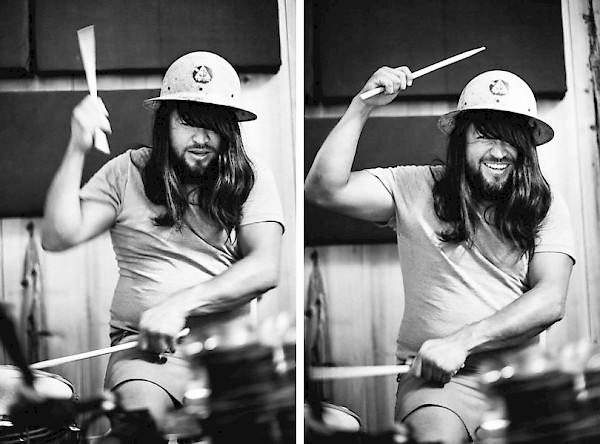 Photo by Jason Quigley
Photo by Jason Quigley
Soon, Fimbres joined another band. And another. And probably another one, too. The rest is sort of history.
“I started realizing, ‘Hey man, why don’t I just join more bands and play as much as I can?’ To this day I still hold true to that.”
Perhaps most striking about Fimbres’ musical orbiting is the sheer aural variety inherent in the projects he chooses to be part of. With footing in math-rockian experimental drumming, jazzy syncopation, and dexterity with congas and timbales, as well as flute, his is a menagerie of mystical sounds that threaten to smash through dimensions at almost every turn.
“The main parameter for me [when considering a new project] is an energetic connection with someone,” Fimbres explains. “I hardly ever just jam with people because it’s not really my thing. It’s always like-minded and we always come to a conclusion like, ‘We need to do this.’ Sometimes it’s a specific idea, and sometimes it’s just spontaneity. Sometimes we just record. It’s a really healthy thing for every musician to do: Try to record an album without any idea as to what you’re doing or how you’re gonna do it or what it’s gonna sound like. I think it’s very healthy for the human brain to do that, just to create music on the spot and record it. Once you’re done with it, just move forward with life. Make more albums.”
Fimbres is also a notoriously reliable last-minute fill-in (this summer’s Lose Yr Mind festival featured Fimbres manning the drum kit on a late request by Wooden Indian Burial Ground), and a hilariously engaging stage presence, to boot. Simply put, the guy looks like he’s having the time of his fucking life every single time he’s performing. Shirt on, shirt off—it doesn’t matter. Turns out he totally is.
“I was put on this earth—or this earth was put on me—to fucking play music. I know it,” Fimbres asserts. “I know it 100 percent. It’s very exhilarating and very enlightening to know that I can play music and be happy and share this sound with people and people can relate to it and reciprocate.”
For Portlanders, at least temporarily, time to relate to and/or reciprocate that sound and energy is running out. Fimbres and his wife Shana Lindbeck (also of Orquestra Pacifico Tropical) are moving to Germany for a year beginning in August 2015. Perhaps not unsurprisingly, they’ve already forged a duo, dubbed Dreckig, which translates to dirty in German. Dreckig is recording an album prior to the couple’s departure and will perform the album abroad during their stay. Additionally, the other two members of Sun Angle are planning to fly out to perform some shows, and Fimbres’ Paper/Upper/Cuts project is also likely to see stage time throughout Germany and Northern Europe.
“I feel like I’m on such a rad high right now and I figured why not continue this in another environment and ignite something different in other people?” Fimbres asks.
It must be mentioned that Fimbres’ lust for life is as infectious and energetic as his musicality. There are passions gurgling beneath the inflections of his colorful vernacular, zeal in every “rad,” “mega” or “super” adjective that belie—though sometimes accentuate—his deep, personal, cosmic connection with the music he’s made and the music he wants to be a part of creating in the future. And that is key to understanding the scope by which Fimbres operates his thriving network of projects. They are about capturing moments, oftentimes spontaneously and without rehearsal, and then moving on. Anticipating near-future evolutions are just as important as recreating the sparks that yield whatever “sustained artistic merit” might mean. Fimbres seems to understand that the longer you try to bottle lightning, your spark is bound to get zapped.
“Anything is possible in this world, which is amazing,” says Fimbres, in closing. “I’m really fortunate and excited about everything in life right now. Fucking life rules!”

